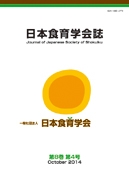
- 4 号 p. 187-
- 3 号 p. 119-
- 2 号 p. 75-
- 1 号 p. 13-
- |<
- <
- 1
- >
- >|
-
鈴木 美穂, 柵木 嘉和2021 年 15 巻 2 号 p. 75-84
発行日: 2021/04/25
公開日: 2021/06/17
ジャーナル フリーThe purpose of this study was to examine the relationship of the frequency of meals of pregnant women that follow a Japanese dietary pattern including staple foods, main dishes, and side dishes, with their food intake status, food knowledge, and eating behavior. We conducted a questionnaire survey and a dietary survey using a weighing method for 2 days on 137 women 11 to 15 weeks pregnant who visited our obstetric medical institution in S City, Mie Prefecture from August 2017 to March 2018. Overall, data from 108 participants were examined. Based on the results of the dietary survey, the frequency of ingesting meals that followed a Japanese dietary pattern was classified as “twice a day or more” or “less than twice a day”. The t-test, Mann-Whitney U-test, χ2 test, and Fisher’s exact test were used to assess comparisons between the two groups. Total energy, protein energy ratio, and potassium, calcium, magnesium, iron, zinc, vitamin A, vitamin K, folic acid, and cholesterol levels were significantly higher in the twice a day or more group than the less than twice a day group. Women in the twice a day or more group consumed significantly more green and yellow vegetables and seeds. Women in the less than twice a day group consumed fast food significantly more often, used significantly more salt, and did not significantly utilize nutritional components.
Those who followed a Japanese dietary pattern less than twice a day were likely have a low food awareness, and it is important to help them acquire appropriate dietary knowledge and skills before pregnancy.
抄録全体を表示PDF形式でダウンロード (1836K)
-
山本 倫也, 井上 真奈美, 甲斐 美智代, 早川 智之, 田中 マキ子, 中村 文哉, 人見 英里, 吉村 耕一2021 年 15 巻 2 号 p. 85-94
発行日: 2021/04/25
公開日: 2021/06/17
ジャーナル フリーThe purpose of this study was to investigate the relationship of health eating literacy to eating habits and life experiences in university students. A multiple-choice questionnaire was conducted among 299 students in Yamaguchi Prefectural University. The results showed that only about half of students had the abilities to assess, to convey and to utilize the eating-related information, while most of the students had the abilities to acquire and to understand it. The results also showed that among the 5 abilities for health eating literacy, the former three had a significant relationship with proper eating habits, experience of interpersonal communication, eating-related experience with a family and experiences in a natural environment. Our results suggest that paying attention to these habits and experiences may be important for improving the health eating literacy of university students.
抄録全体を表示PDF形式でダウンロード (2520K) -
小林 知未, 森永 文也, 西尾 久子2021 年 15 巻 2 号 p. 95-103
発行日: 2021/04/25
公開日: 2021/06/17
ジャーナル フリーThe present study examined the Shokuiku program, which aimed to improve the breakfast intake habits of preschool children.
Thirty-two children (16 boys and 16 girls) were included in the analysis. We conducted the breakfast sheet survey (the 1st survey) on June 4-8, 2018, and presented a lecture on Shokuiku education on June 15. In addition, we conducted a survey (the 2nd survey) on June 18-22. We categorized foods into five groups (Grain dishes [yellow], Vegetable dishes [green], Fish and Meat dishes [red], Milk and Milk products [blue], and Fruit [orange]). These five groups were listed in a table on the breakfast sheet. Each morning, the children placed stickers that matched the breakfast food group that they ate in a table on their breakfast sheet.
At the time of 2nd survey, the rate of skipping breakfast, the number of stickers per food groups, and the relationship between the number of stickers applied between food groups showed an improvement in comparison to the 1st survey.
These findings suggest that this was due to the effects of the Shokuiku program. Since nutritional education for parents was limited to a letter and medals made by the children, in the future, it will be necessary to continue to support not only the children but also their parents.
抄録全体を表示PDF形式でダウンロード (1274K) -
髙木 祐介, 北 哲也, 福地 かおり, 小木曽 洋介, 藤原 紗音, 坪田 周介, 吉川 明里, 幸田 三広2021 年 15 巻 2 号 p. 105-110
発行日: 2021/04/25
公開日: 2021/06/17
ジャーナル フリー[Purpose] The purpose of this study was to investigate the changes of the subjective symptoms in individuals with or without a breakfast during the physical education swim class in morning. [Methods] Nineteen Japanese healthy male students with (=BH group, n=12, age : 16±0 years) or without (=NH group, n=7, age : 16±0 years) a breakfast volunteered to participate in this study. The content of the physical class was swimming (approximate 400m for 90 minutes) in summer (Temperature : 29.4±1.2°C, Relative humidity : 49.5±5.0%). Participant’s health check (‘‘no concentration’’ and ‘‘no vigor’’) and the indices of subjective symptoms (Fatigue, Sleepiness, Hunger) were measured during resting state in a room before and after (only the subjective symptoms) the first-hour physical education class. [Results & Discussion] Significant increases in Hunger, ‘‘no concentration’’ and ‘‘no vigor’’ in NH group were compared to BH group before the class (p<0.05). Though Hunger in BH group after the class was significantly higher than that of before (p<0.05), no significant difference was found on Hunger between before and after class in NH group. It was observed that the changes in the subjective symptoms before and after the first-hour physical education class varied depending on whether to eat a breakfast.
抄録全体を表示PDF形式でダウンロード (438K)
- |<
- <
- 1
- >
- >|